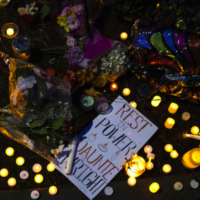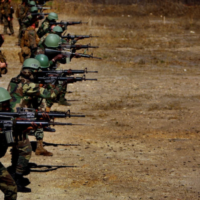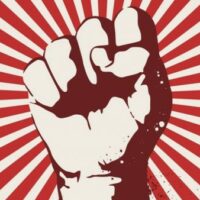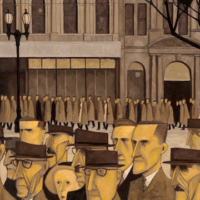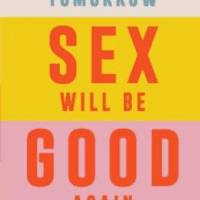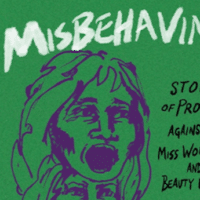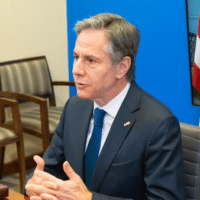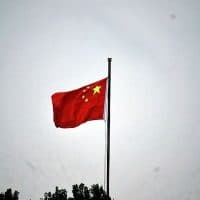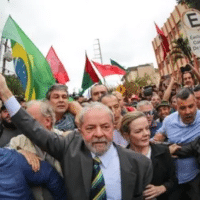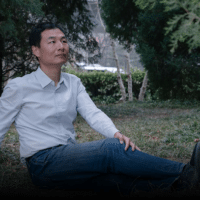-
Report sheds light on the pattern of over-policing that led cops to pull over Daunte Wright
The criminal legal system “relies heavily on collecting money from the very people targeted by the system,” in the process incentivizing police to punish as many people as possible, the authors of the ACLU report write.
-
Risen from the Ruins: The Economic History of Socialism in the German Democratic Republic
The German Democratic Republic (DDR) was a socialist state founded in 1949 as a democratic, antifascist reaction to the Second World War. It redistributed land, socialised the means of production, and collectivised the agricultural system.
-
Pentagon adds Africa to Global battleground with China and Russia
General Stephen Townsend, commander of U.S. Africa Command (AFRICOM), and General Kenneth McKenzie, commander of U.S. Central Command, are scheduled to testify before the Senate Armed Services Committee on April 22.
-
Towards a Marxist theatre
With the onset of the pandemic, the second Black Lives Matter movement, and the economic crisis, theatre as an art form and an industry is in a period of crisis and rebuilding.
-
The Supreme Court is also to blame for Daunte Wright’s death
When veteran Minnesota police officer Kimberly Potter, who is white, stopped Daunte Wright, a 20-year-old Black man, for an expired registration tag, she committed an act of racial profiling.
-
Principles of radical political economics
The starting point for radical political economists is agreement on the need to oppose injustice and oppression and the conviction that a theoretical understanding of contemporary societies can contribute to the political movements necessary to address them.
-
The classes of capitalism
Capitalist society is divided into different classes, and the relationships between those classes shape the production of wealth, the dissemination of ideas and the nature of politics.
-
Resistance against the policies imposed by the World Bank, the IMF and other creditors between 2007 and 2011
Ecuador provides an example of a government which officially decided to investigate the process of indebtedness so as to identify illegitimate debt and suspend its repayment.
-
Katherine Angel, ‘Tomorrow Sex Will Be Good Again: Women and Desire in the Age of Consent’
Katherine Angel’s intervention into post-feminist discourse fits the script of recent events and sits at what’s hopefully the tail end of post-feminist discourse, otherwise known as ‘the sex wars’.
-
The Revolutionary Meaning of the George Floyd Uprising
At least 28 people died in the wave of social unrest that rocked the United States from late May until late July in 2020. In this 10-week period, there were 574 riots; 624 arsons; 2,382 incidents of looting; 97 police vehicles set on fire; and 16,241 people arrested for protest-related activities.
-
Review – Misbehaving
A new edited volume emphasises that the personal is political and highlights the power of spectacular direct action, says Alice Robson
-
Cuba libre to be COVID-libre: Five vaccines and counting
This pandemic has affirmed that public healthcare needs cannot be adequately met under a profit-based system.
-
Why the U.S. shouldn’t play games with cyberwarfare as its power declines
Two major cyberhacks—of ‘SolarWinds’ and ‘Microsoft Exchange Server’—have affected a whole range of computer systems worldwide. Both are supply chain hacks, meaning that they appeared to be routine software upgrades for particular components in these systems instead of inserted malicious codes.
-
What Bill Gates has wrong about “advanced” nuclear reactors
If nuclear power needs to be part of the climate solution, why not continue to use what we have? I understand the reactors that we have are aging out. But why not either shore those up or use the same design that we currently have where we wouldn’t have to go through the lengthy and costly development phase?
-
Why Xinjiang is emerging as the epicenter of the U.S. Cold War on China
The U.S. government’s information warfare against China has produced the “fact” that there is genocide in Xinjiang. Once this has been established, it helps develop diplomatic and economic warfare.
-
U.S. expects Russia to submit. Will it?
In his landmark foreign policy speech delivered from the U.S. state department on February 4, President Joe Biden had proclaimed that “America is back. Diplomacy is back at the centre of our foreign policy.” That maxim was put to test last week. And it failed to make the grade.
-
Michael Hudson: America’s neoliberal financialization policy vs. China’s industrial socialism
Nearly half a millennium ago Niccolo Machiavelli’s The Princedescribed three options for how a conquering power might treat states that it defeated in war but that “have been accustomed to live under their own laws and in freedom.
-
For an ecosocialist transition that breaks from capitalism: Arguments and proposals
The 149 proposals issued by the French Citizens’ Convention on Climate last June, with the goal of achieving at least a 40% reduction in greenhouse gases by 2030 compared to 1990, manifestly belong to a thoroughly reformist approach.
-
Supreme Court confirms annulment of all charges against Lula
Brazil’s Supreme Court on Thursday ratified the decision adopted by one of its judges, who annulled the sentences handed down in the first place against former president Luiz Inácio Lula da Silva.
-
Battles lost, wars won: An environmentalist’s story
After Friends of Nature director-general Zhang Boju saw his activism fail, he went another route.

